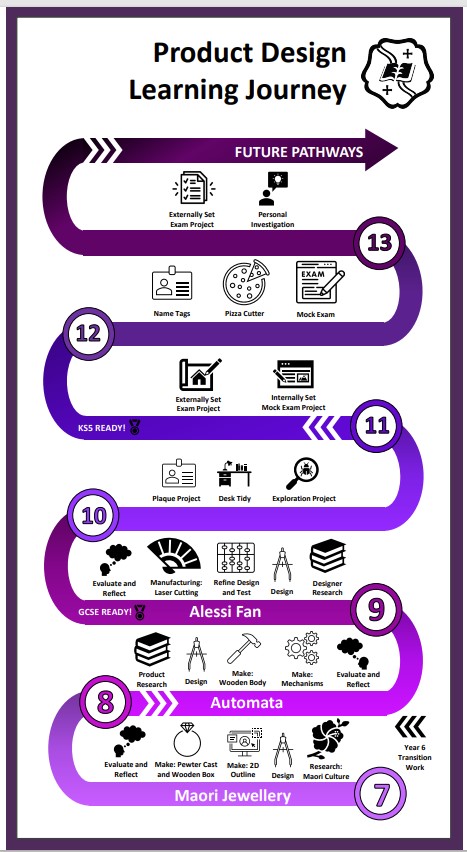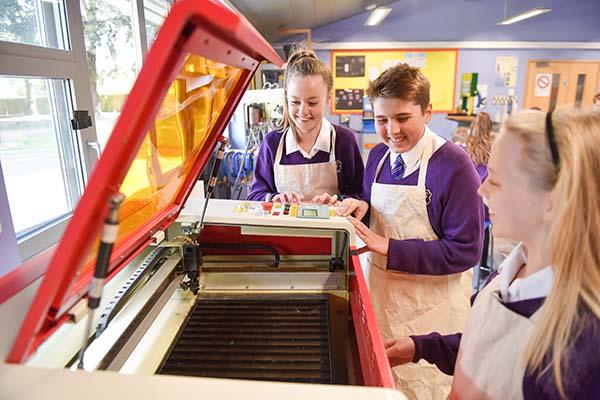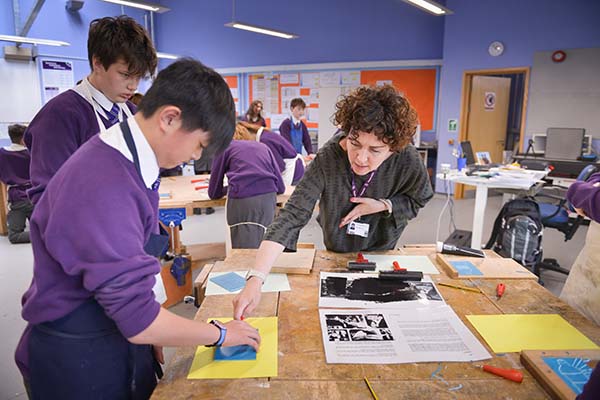Overview
GCSE Design and Technology will prepare students to participate confidently and successfully in an increasingly technological world. Students will gain awareness and learn from wider influences on Design and Technology including historical, social, cultural, environmental and economic factors. Students will get the opportunity to work creatively when designing and making and apply technical and practical expertise.
KS4 Intent Statement
Art, Design and Technology subjects at GCSE sit in the curriculum to extend our visual and oral literacy. At GCSE these begin to encompass the importance of person choice, further independence, self-discovery, and individualisation as the driving force of our broad curriculum areas. The diversity of our curriculum is wide and broad, allowing all students of all abilities to make personal informed choices for subject selection at GCSE in ADT. Careful support and guidance during the progression stage from KS3 to 4, are built into our ADT plan. Developing students and parents knowledge and understanding of what our subjects offer across ADT. Encompassing an outlet avenue to all students of all abilities ensuring they feel confident to perform successfully in one or more areas in ADT.
GCSE offers a new layer of self-awareness, social, cultural and moral diversity across ADT. In some of the Art and Design subjects, this is an outlet for personal projects and investigations that unpin the deeper conceptual thoughts, which can act as a layer of support to some of our more vulnerable students. Our curriculum is one that offers something for all, where diversity is celebrated and personal outlet is encouraged and embraced. ADT seeks to raise aspirations for students of all abilities, regardless of academic achievement. Independent skills learnt at KS3 are develop upon; time management and personal choice drive students’ independence and the smooth transition from learning at KS3 to GCSE. Written and visual language, use of subject terminology are key to success and understanding of the Assessment Objectives from KS3 to 4.
Refining skills and understanding the wider knowledge of a broader variety of ingredients, materials, styles and processes inform students’ choices whilst influenced by the wider world of Art, Design and Technology. Enhancing students’ opportunities to extend on basic use and understanding of techniques from KS3. E.g. Pencil use to graphite stick, watercolours to oil paints in Fine Art. Cooking pasta to making pasta in Food Preparation and Nutrition. Developing digital skills with subject specific software (adobe) in Graphics to designing functional products. Product Design casting to vacuum forming. Making fabric samples to garments in Textile Design. All subject areas Develop and extend on technical skills and knowledge taught at Key stage 3 to 4 , this is an integral part of students learning journey, which is embedded in our curriculum planning
Developmental work on personalisation of presentation skills in workbooks/ folders portfolios/sketchbooks, scale, size and time management are all-important learning focuses at KS4. Developing students own style in ADT subjects, drawing on personal interests, strengths and in some cases self-expression. Students have an opportunity to develop and share their interests through coursework-based work and sustained projects. Which lead to more opportunities for peer discussion and sharing of group ideas. There are opportunities to take personal experiences and apply them to real life world problems. Individual and holistic development is embraced and encouraged through celebration of all work from all students - in our end of year in our GCSE and A level exhibition. Celebration of work within the local community from invites to exhibitions, Residents’ afternoon tea, embeds our strengths in ADT.
Future aspirations in careers and educational experience and routes are enhanced at KS4, lead by subject assemblies with our ADT KS5 Ambassadors as role models. Outside agencies support our career pathways for example: Guest chef, Royal Navy chefs, workshops with Arts University, Elite Art group, clubs, gallery visits, trips, and our residential in Conway working with artist, all extended learning opportunities fuelling passions to the wider world of ADT. Key stage 4 supports the technical processes and life skills learnt at KS3, whilst extending on their visual, critical, emotional and personal development.
Qualification Details
Exam Board: AQA
Qualification Title: Product Design
Qualification Specification Code: 8205
Qualification Webpage: Click here to visit the AQA webpage for the specification.
Why should I study this course?
If you have a genuine passion for working with processes such as: model making, constructing, surface treatment, assembling whilst enjoy being creative and using your imagination, the 3D Product Design course is very versatile and extremely enjoyable.
What knowledge and/or skills will I need?
Students must demonstrate they have a genuine passion for Design with an inquisitive, creative mind and the desire to further their knowledge and understanding within the subject. It is essential that they enjoy working in a wide variety of materials with the ability to take risks and work independently.
What will I study in this qualification?

How will I be assessed?
The exams and non-exam assessment will be measured on how students have achieved the following Assessment Objectives:
AO1: Develop ideas through investigations, demonstrating critical understanding of sources.
AO2: Refine work by exploring ideas, selecting and experimenting with appropriate media, materials, techniques and processes.
AO3: Record ideas, observations and insights relevant to intentions as work progresses.
AO4: Present a personal and meaningful response that realises intentions and demonstrates understanding of visual language.
Marks for both Portfolio and Externally Set Assignment are marked out of 96 marks.
Possible Career Paths
A level in Design and Technology
Foundation careers



